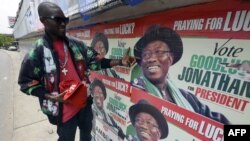Nigeria’s fifth presidential election on March 28 is expected to be the tightest since the country returned to democracy in 1999. That’s not the only way this vote might be different.
From the balance of political power to the way ballots will be cast, analysts say a number of changes are in store for Saturday’s vote.
Disunity among opposition groups has helped the ruling People’s Democratic Party, or PDP, to claim victory in the past four contests. But that changed in 2013, when leading opposition parties overcame differences to form the All Progressives Congress, or APC.
Analysts expect that party to present a major challenge to the PDP and their leader, incumbent President Goodluck Jonathan.
While the party is a new factor in these elections, the politicians are not.
Surging APC
APC candidate Muhammadu Buhari is very familiar to Nigerians. Jonathan bested the former military ruler in 2011 elections. But political commentator Chris Ngowdo said the PDP’s nationwide support base -- so crucial to its 2011 election success -- may not be there this time around.
“Historically, opposition parties tended to be the regional parties and have lost national elections as a result," said Ngowdo. "But for the first time there’s really a situation where the roles are reversed, and the opposition party is now the national coalition and the ruling party has, through result of its political miscalculations, has shrunk to become a regional party.”
Jonathan is highly popular in the southeast and in his native southern Niger Delta region. In 2011, he won 99 percent of the vote in several states in the region.
The massive turnout for Jonathan, said Jibrin Ibrahim, a fellow at the Center for Democracy and Development, is unlikely this time due to better anti-fraud measures being implemented.
“Almost everybody on the voter’s lists was [listed as] having voted for the president. In a real election that wouldn’t be possible. You don’t get 99 percent turnout,” said Ibrahim.
Fair balloting
Ibrahim said changes in the way ballots are cast in this election will reduce ballot box stuffing and make the election fairer than before.
Voters now have to present a plastic identification card and be biometrically verified before casting ballots. The new identification system has proven controversial, and was challenged in court. But if deployed properly, Ibrahim says it will make the election more credible.
But while there’s a better likelihood the voting will be more transparent, the campaigning surrounding the vote has been markedly more divisive compared to 2011.
Emmanuel Onwubiko, a retired journalist and head of the Human Rights Writers’ Association of Nigeria, said political speech was more restrained in the 2011 campaigning, possibly because President Umaru Yar’Adua had died in office just a year before.
By contrast, in the months preceding this election, Onwubiko said politicians have shown no such restraint.
“It’s a time that most of these contentious issues have resurrected. Issue of which of the zones of the country should produce the presidency of Nigeria," Onwubiko said. "Is it the north, or is the south? Then apart from that, the two dominant parties, the PDP and the APC have also played up the issue of religion, issues of ethnicity, issues of regionalism, to sway voters to their own side.”
And then there’s Boko Haram. The Islamist extremist group was a problem during the 2011 vote, but it wasn’t allied with Islamic State militants, and wasn’t the target of a multinational military campaign, as it is now.
It also had not disenfranchised more than 1 million voters through violent terror tactics.
Boko Haram doesn’t talk to the media, but it has threatened to disrupt Saturday's election. Whether they make good on that threat is anyone’s guess.




